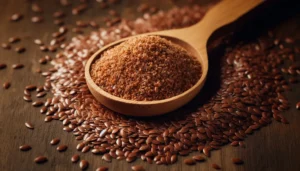The Power of Flaxseed for IBD Relief
Inflammatory Bowel Disease (IBD) can be a challenging condition, significantly impacting the quality of life for those affected. Comprising mainly two types—Crohn’s disease and ulcerative colitis—IBD is characterized by chronic inflammation of the gastrointestinal tract. Amidst various treatment options, natural remedies often come into play, offering benefits without the side effects typically associated with conventional medicine. One such natural remedy that has garnered attention is flaxseed. Known for its robust nutritional profile, flaxseed for IBD might just be the relief many are searching for.
In this blog post, we’ll dig into the anti-inflammatory benefits of flaxseed and how it can help manage the symptoms of IBD. Whether you’re newly diagnosed, a long-time sufferer, or simply looking for healthier dietary options, understanding how flaxseed can influence your condition could open the door to improved gut health and overall well-being.
Understanding IBD and Its Challenges
Inflammatory Bowel Disease, or IBD, is not just one but a group of disorders. These primarily include Crohn’s disease and ulcerative colitis. Both conditions are marked by an ongoing inflammation of the gastrointestinal tract. This inflammation can cause a range of symptoms. These symptoms often include severe abdominal pain, diarrhea, fatigue, weight loss, and malnutrition. Such a broad spectrum of symptoms not only affects physical health but also emotional and social well-being.
IBD is unpredictable. Flare-ups can occur without warning, making daily life challenging and often disrupting normal activities. The exact cause of IBD remains unclear, but it involves a complex interplay of genetic factors, immune system responses, and environmental triggers. This complexity makes it crucial to explore various management strategies, including dietary changes.
In our journey to understand how diet influences IBD, flaxseed emerges as a compelling topic due to its anti-inflammatory properties. This brings us to an important question: how exactly can flaxseed be a beneficial addition for those battling IBD?
The Anti-Inflammatory Benefits of Flaxseed
Flaxseed is increasingly recognized for its potent anti-inflammatory properties, which can play a crucial role in managing inflammatory bowel diseases (IBD) such as Crohn’s disease and ulcerative colitis. A significant contributor to this anti-inflammatory action is a group of cyclic peptides known as flaxseed linusorbs (FLs).
Key Components and Mechanisms (The Science Stuff)
Flaxseed linusorbs, particularly FLA and FLE, have demonstrated remarkable efficacy in inhibiting key pathways involved in inflammation. These peptides significantly suppress the activation of TLR4/NF-κB/MAPK pathways, crucial for their anti-inflammatory effects. The study conducted by Li et al. (2023) provided insights into how these peptides modulate inflammation at a cellular level.
The study found that FLs target the TLR4 receptor on the surface of macrophages, a type of immune cell that plays a pivotal role in inflammation. By interfering with this pathway, FLs prevent the activation of NF-κB and MAPK signaling cascades, which are instrumental in promoting inflammatory responses in the body.

Implications for IBD
Inflammatory bowel diseases are characterized by chronic inflammation of the gastrointestinal tract, leading to symptoms such as pain, diarrhea, and intestinal damage. The ability of flaxseed linusorbs to inhibit TLR4/NF-κB/MAPK pathways suggests they could reduce the inflammatory response in IBD patients, leading to alleviation of symptoms and potentially, a decrease in the frequency of flare-ups.
The research highlighted that FLs significantly reduce the production of inflammatory cytokines such as TNF-α, IL-1β, and IL-6 in macrophages. These cytokines are typically elevated in IBD and contribute to the inflammation and damage observed in the intestines. By reducing these cytokines, flaxseed could offer a natural, therapeutic strategy to manage IBD.
Practical Takeaways
For individuals managing IBD, incorporating flaxseed into the diet might provide beneficial effects due to its components’ ability to modulate inflammation effectively. However, as the study notes, the introduction of flaxseed should be gradual to monitor any potential dietary sensitivity and to allow the body to adjust to increased fiber intake.
In summary, the anti-inflammatory properties of flaxseed, particularly through its components like FLA and FLE, provide a promising avenue for managing inflammatory processes associated with IBD. The findings from Li et al. (2023) underscore the potential of dietary interventions with flaxseed to improve health outcomes in IBD patients.
Adding Flaxseed to Your IBD Diet: Simple Tips
Incorporating flaxseed into your diet is a straightforward way to harness its anti-inflammatory benefits, especially for those managing IBD. Below are some simple and effective ways to start.
Ground Flaxseed
Because whole flaxseeds can pass through the intestine undigested, which means you won’t get all the benefits, it’s best to consume flaxseed in its ground form. Ground flaxseed can be easily added to smoothies, yogurts, and baked goods, enhancing your meals with little change in texture.

Flaxseed Oil
Incorporating flaxseed oil into your diet is another effective way to consume ALA, the omega-3 fatty acids. It can be used as a dressing for salads or added to smoothies. However, flaxseed oil should not be used for cooking at high temperatures, as it can break down and lose its nutritional properties.
As a Topping
Sprinkle ground flaxseed over breakfast cereals, oatmeal, or salads for an extra nutrient boost. This not only increases your fiber intake but also adds a nutty flavor to your meals.

Precautions and Considerations
While flaxseed is generally safe for many people, those with IBD should consider a few precautions.
Gradual Introduction
Start with small amounts of flaxseed to see how your body reacts, especially during periods of remission. Since flaxseed is high in fiber, introducing it too quickly can lead to bloating, gas, or abdominal discomfort.
Hydration
Increase your water intake when adding more fiber to your diet. This helps prevent constipation and supports overall digestive health.
Embracing Flaxseed for IBD Management
The journey through the science behind flaxseed and its role in reducing inflammation illustrates a promising path for those battling inflammatory bowel disease (IBD). The anti-inflammatory properties of flaxseed, especially its linusorbs like FLA and FLE, have shown to directly impact the pathways that exacerbate IBD symptoms, offering not just hope, but a practical solution to alleviate pain and discomfort associated with the disease.
Incorporating flaxseed into the diet might seem like a simple change, but it’s one that could significantly impact the management of IBD. By targeting the inflammatory processes at a molecular level, flaxseed provides a natural, accessible means of enhancing gastrointestinal health and overall well-being.

Your Path to Improved Gut Health
Are you ready to take a step towards better managing your IBD? Here’s how you can get started:
- Consult with Your Doctor: Before making any dietary changes, especially when managing a condition like IBD, it’s crucial to discuss them with your healthcare provider.
- Start Small: If you’re new to flaxseed, begin with small amounts to see how your body reacts, and gradually increase your intake based on your tolerance.
- Stay Informed: Keep educating yourself about IBD and the role of diet in managing this condition. Knowledge is your best tool for taking control of your health.
- Share Your Experience: If flaxseed is beneficial for you, share your story. Your experience could encourage others to explore dietary options that might alleviate their symptoms as well.
- Engage with the Community: Join forums, attend workshops, and connect with others living with IBD. Community support is invaluable.
We invite you to comment below about your experiences with flaxseed or any questions you might have about incorporating it into your diet. Let’s foster a community where knowledge and experiences are shared for everyone’s benefit!


